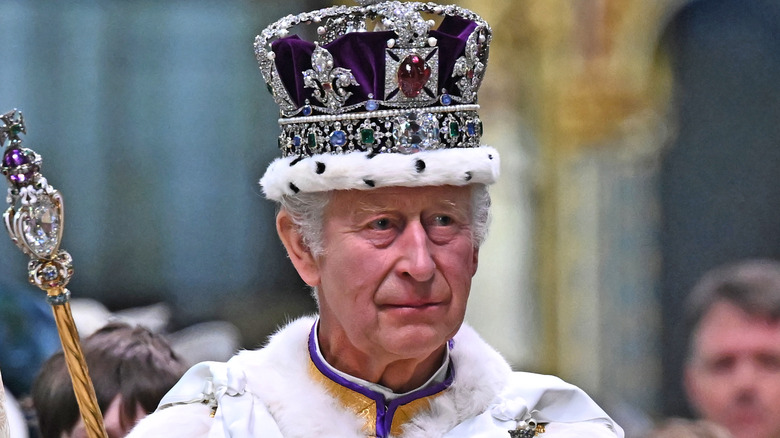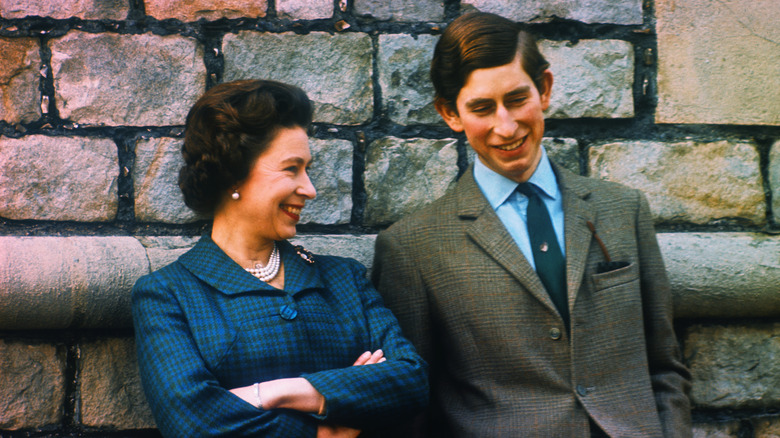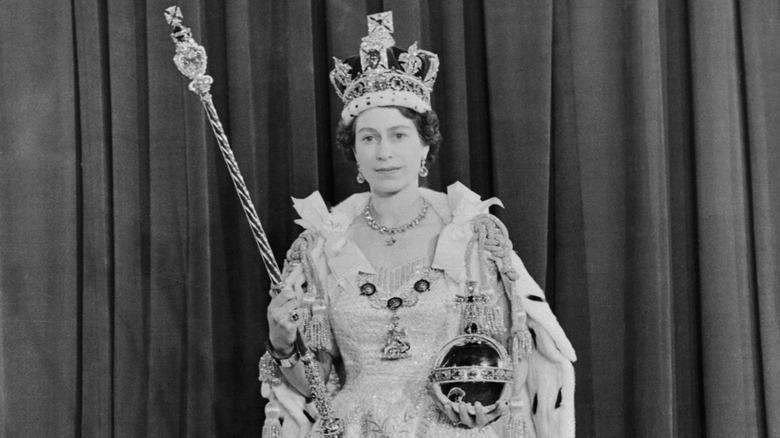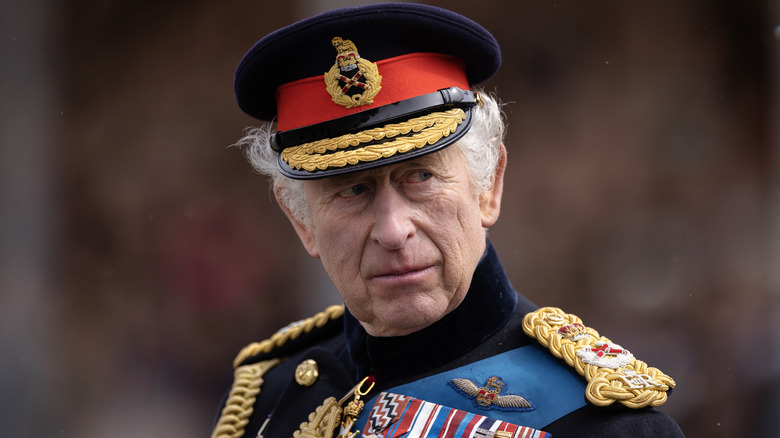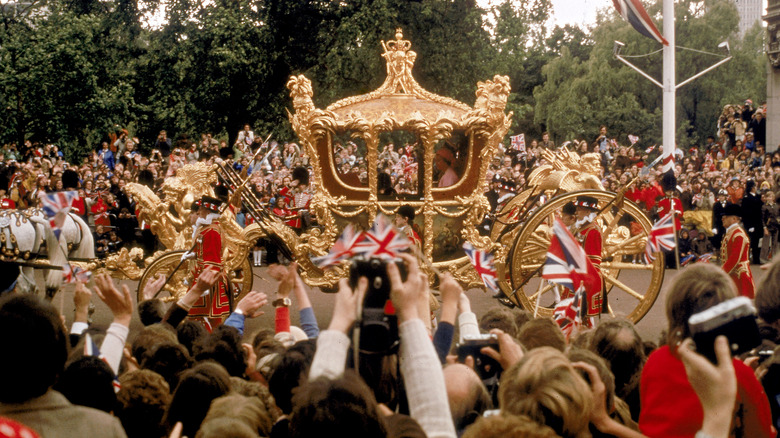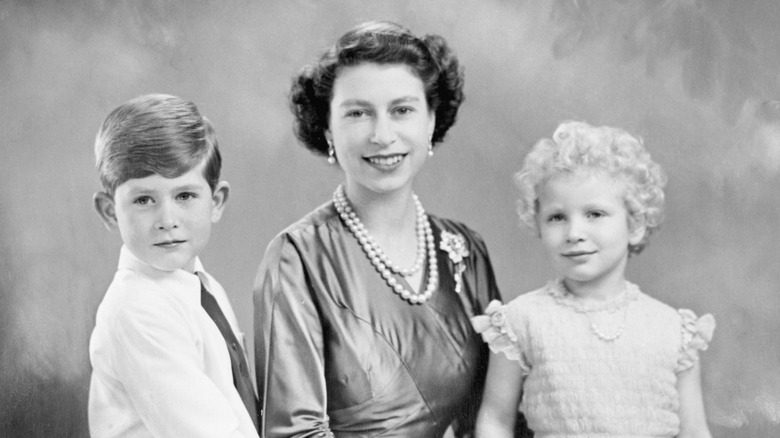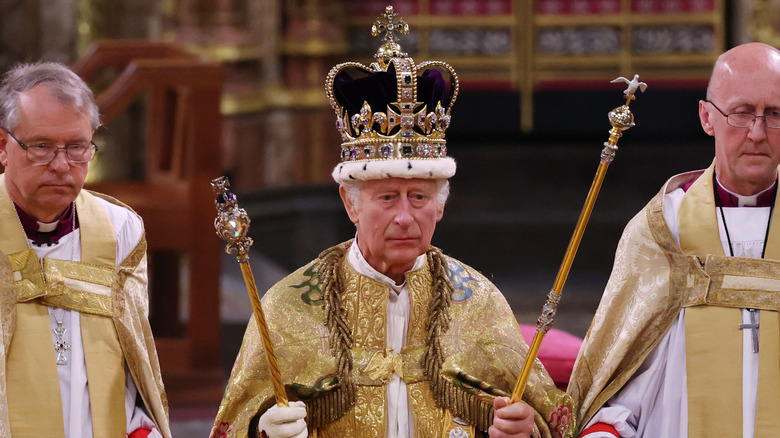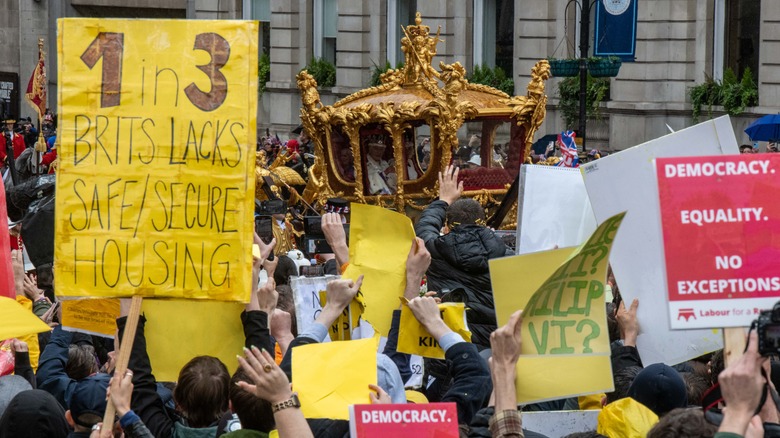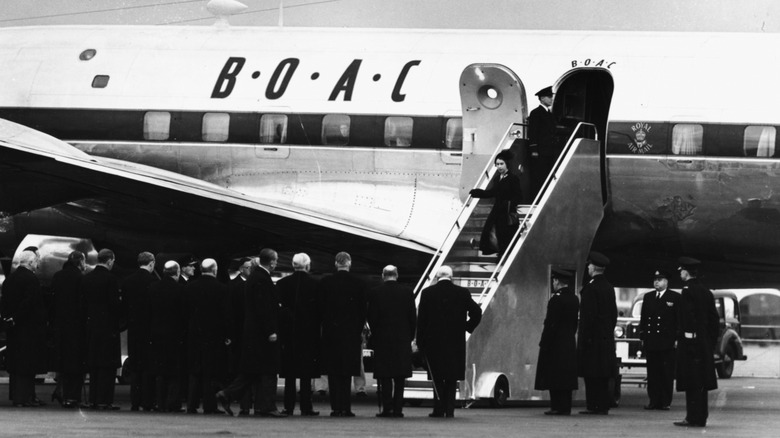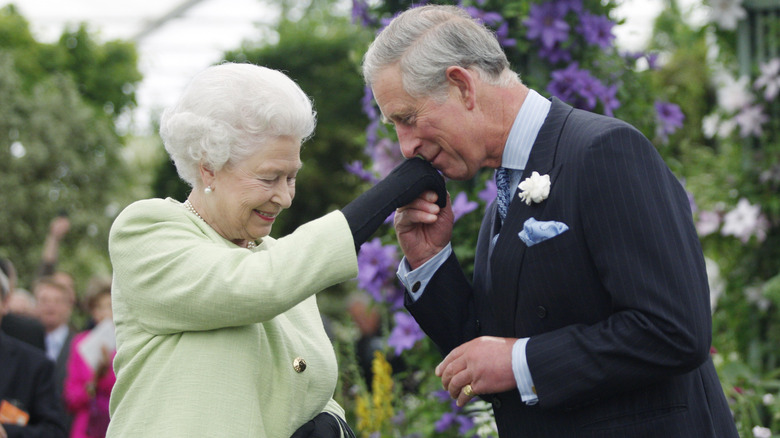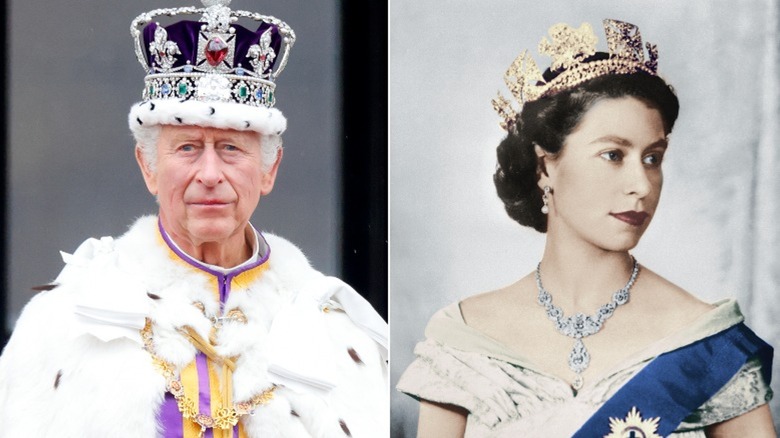How King Charles' First Year As Monarch Compares To Queen Elizabeth's
Queen Elizabeth II's death after 70 years on the British throne marked the end of an era. For decades, the queen was a consistent and reliable fixture on the world's stage, representing the stability of the monarchy and the dedication to service that her father, King George VI, embodied before her. She not only ruled for over a half-century, but her presence evoked a sense of monarchal dedication that her generation — and the ones prior — held in high regard. In many ways, Elizabeth was the final representation of the royal family's golden years of public influence, respect, and necessity.
King Charles III, meanwhile, has had to navigate a very different terrain. Becoming king immediately upon his mother's death, Charles waited decades to sit on the throne, all while watching the world rapidly change around him. While Elizabeth was seen — up until her death — as a representation of Britain in all its glory, the same level of regard has not been passed to her son, causing his first year on the job to be quite the uphill battle.
Elizabeth and Charles' individual reigns could not look more different — the scope, their ages, the world in which they're ruling — are all vastly opposed.
Queen Elizabeth was largely unprepared for the job, while King Charles had decades to learn
When Queen Elizabeth II was just 14 years old, she issued a broadcast to England's children as World War II was raging. She urged them to remain steadfast, even though the landscape of Europe was frightening. Not only were her words as a young girl comforting, but they gave the public their first glimpse into who Elizabeth would be as a leader. Despite having had the brief introduction, however, Elizabeth went into the role as monarch largely unprepared, relying on her schooling and instincts to guide her.
Reporting on the public's interest in her all the way back in 1943, The Atlantic detailed that members of the public were curious as to how their future queen was preparing to take on the task, noting that most of her one-day subjects knew "relatively little of her."
Elizabeth's eldest son, King Charles III, however, couldn't have had more of a contrasting experience. Not only was he the oldest monarch to take the throne in the history of Britain, but he had decades to process what his future on the throne would consist of. Watching his mother reign, working for decades as the Prince of Wales, and establishing his own sense of duty outside of being the heir, Charles walked into his first year as monarch with a great deal of experience under his belt.
Elizabeth navigated her first year on the throne as a young woman in a male-dominated culture
Queen Elizabeth II was such a consistent presence both at home and abroad that it was difficult to even imagine a world without her in it. But what some may not know, given that she took the throne all the way back in 1952, was that her first year as monarch was dominated by gender politics.
As an op-ed published in The Washington Post asserted, when Elizabeth took the throne, the culture at the time dictated that she be "effectively tasked with being seen but not heard." It was seen as her job to represent almost a motherly, balanced figure to the Commonwealth — someone who was not objectionable and not opinionated.
Although the world has evolved since the '50s, society is still predominantly male-driven. As king, Charles experiences benefits his mother never had. Far from being "seen but not heard," Charles hasn't been required to shy away from sharing his thoughts on hot-button issues ranging from climate change to immigration.
Queen Elizabeth largely ignored the royal family's past, while Charles is addressing it
For someone in the public eye for so many decades, Queen Elizabeth II managed to get through with her reputation rather unscathed. However, her death brought up complicated aspects of her legacy, and one issue that she failed to rectify — both in her first year as monarch and subsequent years — was the monarchy's connection to colonization.
Conversely, King Charles III spent much of his first year as monarch trying to rectify — or at the very least acknowledge — the royal family's complicated history. He quickly pledged to thoroughly vet the monarchy's past connections to slavery, leading watchers to weigh in on the vital reflection needed.
Laura Trevelyan, a journalist who's had to reckon with her ancestors having owned and operated a vast slave enterprise in Grenada, told the Times of London, "I hope that he will use some of the wealth that the royal family accumulated from the slave trade to better the lives of people in the Caribbean and in Britain who are descendants of the enslaved."
Elizabeth had ample public support, but Charles struggled to gain approval
Despite navigating her first year as monarch as a young woman in a predominantly patriarchal society, the young Queen Elizabeth II had ample support from the public. She was a young mom in her mid-20s when she was thrust into the role due to the sudden death of her father. Nevertheless, she quickly cultivated an attitude that reflected her dedication to the monarchy. With time, many came to understand that Elizabeth was just as much a person as she was an institution. Reflecting on the queen's legacy in 2020, Time magazine put it best: "No longer the potent florescence of youth, but a hard-worn tree in whose limbs and roots can be traced the archaeology of an era."
King Charles III, however, didn't garner the same support in his first year as monarch. Although he experienced his highest favorability ranking — 70% — immediately following his mother's death, it fell to 60% by August 2023, Statista data shows. Despite her death in 2022, Elizabeth still ranks highest in popularity — with a 76% approval rating and a dislike rating of a mere 6%, according to a 2023 YouGov poll.
Elizabeth was a young mom in her first year as monarch
Perhaps one of the biggest differences between Queen Elizabeth II and King Charles III's first years as monarch has to do with their role as parents. Elizabeth was a mom of two when she took the throne at 27 – Charles, her firstborn, was 3 years old, while her secondborn, Princess Anne, was not yet 2.
According to royal biographer Sally Bedell Smith's book, "Elizabeth The Queen," Elizabeth approached motherhood differently after becoming queen, with Anne and Charles spending the majority of their time "in the six-room nursery complex on the second floor of Buckingham Palace." They were raised primarily by nannies and tutors.
As Charles was in his 70s when he took the throne, his two children, Prince William and Prince Harry, were already grown with children of their own. Instead of having to navigate early parenthood, Charles is able to rely on his oldest son to carry out engagements for the Crown.
Due to his age, King Charles took a careful approach
More than five decades separated Queen Elizabeth II and King Charles III's coronations. Advanced age is not something Queen Elizabeth had to think about in her first year as monarch, but according to historian Ed Owens, Charles started his reign by considering his limited monarchical longevity.
"He now finds himself in, if you like, the autumn of his life, having to think carefully about how he projects his image as a public figure," Owens told PBS in September 2022, noting that even his lifetime of preparation wasn't enough to quell the critics. In fact, many called for Prince William, now the king-in-waiting, to circumvent his father and become monarch in his stead.
Given that William was just 40 years old when his grandmother died and that he enjoys a much higher approval rating than his father, vocal critics asserted that he'd be much better suited for the job. However, due to the 1701 Act of Settlement, which established the British line of succession, it was within Charles' right to take the throne.
The monarchy was largely supported during Elizabeth's first year, while Charles faced a different crowd
Unlike King Charles' late mother, who enjoyed both personal and institutional support, Charles is navigating a public that is growing more and more disillusioned by the monarchy itself.
Over the last three decades, a comprehensive survey conducted by the National Centre for Social Research polled members of the public about the monarch, and just 55% of people said that the monarchy was important for the country (via PBS). Meanwhile, 25% of those surveyed said that the entire institution should be dissolved — the highest percentage ever recorded by the center.
Queen Elizabeth II maintained that her role as queen was to preserve and defend the monarchy at all costs, but the lack of monarchism in the U.K. shows that Charles will have a difficult time doing the same. In fact, within days of taking the throne, protests in Edinburgh erupted. As one protestor, John Hall, told NBC News, "We wanted to make it clear that there's more than one viewpoint about the monarchy in this country. I wanted to be here and mark the fact that I did not consent to this pageantry."
Queen Elizabeth took the monarchy under different circumstances
Though it was undoubtedly an overwhelming experience to lose his mother, King Charles III was prepared to take on the crown following her death. From birth, he was destined to one day rule. The same can certainly not be said for Elizabeth.
When she was born, Elizabeth was quite a distance from the throne, given that it was her uncle, King Edward VIII, who would become monarch in 1936. However, due to his abdication in order to marry American divorcee Wallis Simpson, Elizabeth's father, King George VI, took the throne. That changed the game, transporting 11-year-old Elizabeth to the front of the line of succession.
Elizabeth's father's death also came as a surprise, unlike Elizabeth herself, who died of old age. In Febrruary 1952, Elizabeth traveled to Kenya on behalf of the Crown, not knowing that she would arrive back in Britain as queen. Her father died tragically at the young age of 56, shocking the nation and the daughter who had to rule the nation far earlier than she'd come to expect.
King Charles required no introduction
When Queen Elizabeth II assumed the throne, she knew just how much of her life would be dedicated to service. The same cannot be said for her son. King Charles III sprinted out of the starting gate in his first year as monarch, quickly making his mark. As he was already in his 70s when he took the throne, he won't have nearly as many years to show the public what kind of king he is.
When comparing their first years on the throne, Elizabeth and Charles had two very different approaches. Elizabeth, a young monarch set on establishing herself as a legitimate figurehead, embarked on a royal tour of the Commonwealth that began after her coronation and lasted seven months. She traveled from the West Indies to New Zealand by spring 1954, introducing herself to the nations she was tasked with ruling.
Charles' subjects, however, were already very familiar with him as he had many decades to establish his reputation before becoming king. Upon taking the throne, he focused on bringing stability to the drama-ridden royal family. He maintained his public life and service and made just two overseas trips, both to nations outside of the Commonwealth — one to Germany for a diplomatic visitand one five-day stay in Romania (a trip he takes each spring).
Instead of starting his reign with big changes, Charles hasn't rocked the boat. "It's been surprising in its lack of surprises," royal commentator Pauline Maclaran told the BBC about the monarch's first year on the throne. "People have very quickly become used to him as king. ... It's been a sense of 'not much to see here', which would be seen as a positive."
King Charles' temperament as king already differs from the late queen's (but he does have a lot going on)
In her first year as monarch, Queen Elizabeth adopted a measured and levelheaded approach that would remain throughout the entirety of her reign. She just didn't crack under pressure. In his first days on the throne, however, King Charles was already spotted losing his cool.
To his credit, Charles has experienced so much family drama during his early reign — and, of course, even long before that. Not only did his separation and divorce from Princess Diana in the '90s mark a first for a direct heir to the throne, but his first year as king was dominated by in-fighting — namely with his brother, Prince Andrew, and his son, Prince Harry. Andrew stepped down from public life due to his involvement with Jeffrey Epstein and a resulting sexual abuse lawsuit. Harry, meanwhile, has released tell-all memoirs and a docuseries, making his candid thoughts about his father and the rest of the firm known.

